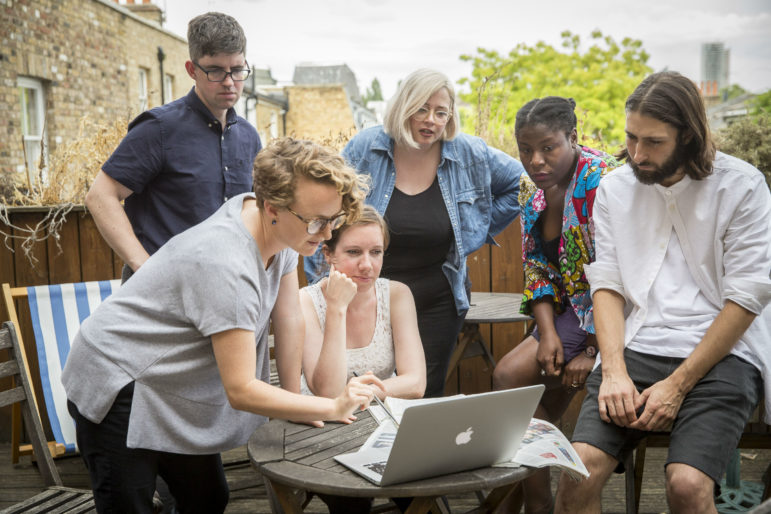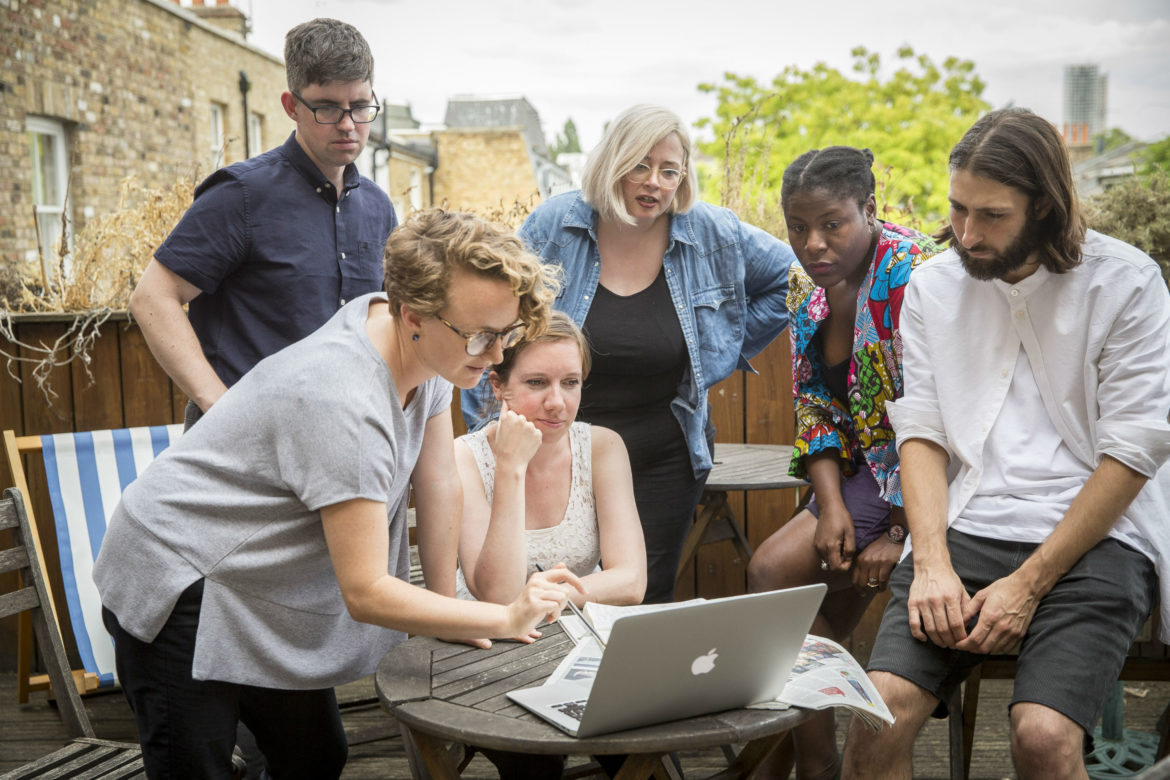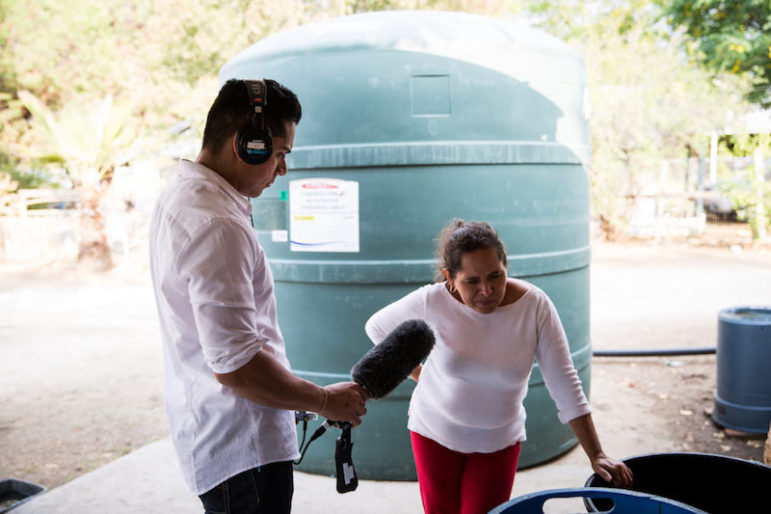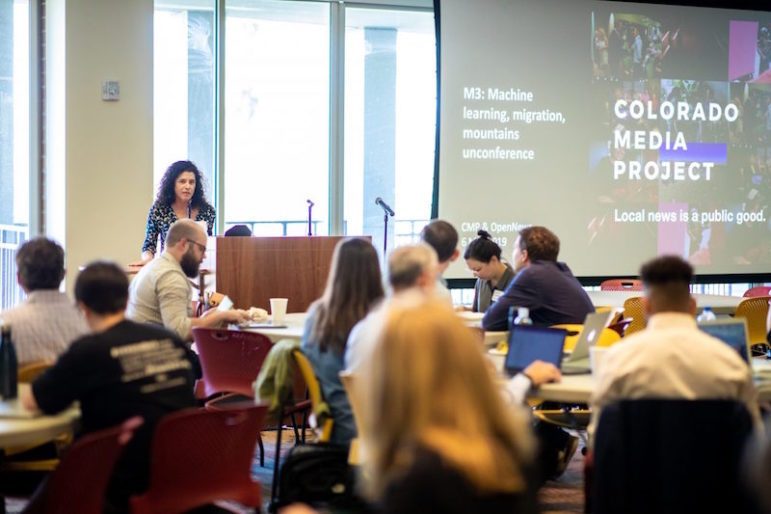

How Partnerships are Boosting Local Investigative Journalism

Collaborating on local investigative projects. The Bureau Local team (left to right): Gareth Davies, Megan Lucero, Maeve McClenaghan, Rachel Hamada, Eliza Anyangwe and Charles Boutaud. Photo: Rob Stothard/TBIJ
The number of local news outlets has plummeted over the last decade in the West, alongside the proliferation of digital platforms and a broken business model. According to a tally of title closures and launches, the UK may have lost 228 local newspapers since 2005, with at least 30 of those disappearing in 2017. In the US, a recent study found that almost 1,800 papers have shut since 2004, leaving nearly 200 counties with no local newspaper at all.
“The people with the least access to local news are often the most vulnerable – the poorest, least educated and most isolated,” found researchers of the study from the University of North Carolina at Chapel Hill. With the cost of investigative journalism untenable for too many struggling newsrooms, how will they be able to play the role of watchdogs and hold local public officials accountable? New models, replicating global collaborations like the International Consortium of Investigative Journalists, may be the answer.
Local Solutions
In the past few years, a number of initiatives have taken root to address the problem of local news vacuums. In 2016, a group of French journalists previously employed by the weekly L’Express launched Médiacités. This local, investigative online media group says that “corruption is on the street corners,” and that it is crucial to approach local news through the investigative lens. Based in four large cities — Lyon, Nantes, Toulouse and Lille — Médiacités has eight permanent journalists and works with some 80 local freelance reporters. In just two years, Mediacités has broken numerous stories, from exposing questionable expenses by a local politician in Lille to obtaining thousands of leaked documents that confirmed dangerous mismanagement at Toulouse University Hospital.
In the UK, The Bureau Local is an investigative network launched by the London-based Bureau of Investigative Journalism in 2017, to focus on community stories across the country.
“Because of the loss of local news outlets, there are worries of a democratic deficit,”Megan Lucero, director of The Bureau Local, told GIJN. “Some areas in the UK are real news deserts. We believe that holding power to account, both locally and nationally, is crucial for a just and equitable society. And we believe local journalism is integral to this accountability.”
The idea was to replicate international collaborations like the Panama Papers at a local level. When a member of the network gets access to information, they share it with the Bureau’s permanent team, which in turn provides IT and data analysis resources, and coordinates among the relevant communities and local reporters. Once local-level investigations are completed, the Bureau produces a national package for maximum local and national impact. So far they’ve counted how many people in the UK die homeless, revealed the impact of budget cuts to domestic violence resources and shown racial profiling in immigration raids.
In the US, nonprofit ProPublica launched the Local Reporting Network in 2017 to support local and regional newsrooms in investigating accountability stories affecting their communities. They’re focusing on conflicts of interest, housing, mental healthcare, criminal justice and workplace safety. ProPublica recently announced they will expand in 2019 to fund reporters at up to 14 news organizations, with half focusing specifically on state governments and politics.
Maximizing Resources
Conflict of interest can loom large in local journalism, when funding depends on powerful local interest. For maximum accountability, Mediacités decided to base their economic model on readers subscriptions only, according to Benjamin Peyrel, a Mediacités founder.
“If we really wanted to be independent, we had to forget advertising because on a local scale, advertising is paid for by local governments or companies that we might potentially have to investigate,” Peyrel said. “Subscription financing was our freedom price. We want to be accountable only to our readers.”
The UK’s Bureau was funded by various organizations, including the Google Digital News Initiative and the Open Society Foundations, avoiding potential conflicts of interest at the local level.
“Local journalists work with us for free,” said Lucero. “They work with us as they would on any other story for their outlet by convincing their editor of the value add for their newspaper. In exchange for the stories, data and collaboration we provide, they have to share findings with the network and respect the embargo.”
Technology is also a crucial tool in local investigations. Mediacités journalists had access to the ICIJ offshore database to look for local public figures, allowing them to expose which French cities had most potential fraudsters and tax dodgers. It has also launched a platform called “lanceurs d’enquête,” a tool for local whistleblowers to leak information securely. The Bureau relies heavily on data journalism to initiate investigations, which are then reported out by local journalists.
“A lot of information is out there, on the internet, but some journalists don’t have have time or means to analyze it,” Lucero said. The role of the Bureau Local is to help with expertise in data journalism and then local journalists go out to report on those findings in their community. “Our aim is absolutely not to threaten or compete with local journalists. On the contrary, we only want to support them.”
Connecting with Local Readers
Connecting with readers is critical for new organizations, especially at the local level. For the launch of “Lanceurs d’enquête,” Mediacités journalists organized events in various French cities. “Our aim is to meet our readers, to get to know them and to know what they want from us,” Peyrel said. The Bureau has gathered 800 supporters, including local reporters, hyperlocal bloggers, developers, engaged citizens, teachers and lawyers — and hired two “community organizer” journalists, whose role is to grow and strengthen the group. They’ll host events across the UK, share their experiences and call on the supporter community for help in investigations.
“We are finding that our network like being part of something bigger,” Lucero said. “This was evident when we ran our Dying Homeless project that counted homeless deaths in the UK. Local media had often covered local deaths in their area. But by pulling all the records together across the UK, the findings were shocking. A count like this was never recorded before. And it prompted change”.
Making an Impact
Local newspapers have been focused on delivering traditional news, rather than investigations, for so long that the local powers-that-be didn’t feel threatened, which initially had Mediacités journalists an advantage.
“At the beginning they were curious and didn’t judge us. Local politicians didn’t expect we would break stories,” said Peyrel. “Now it is more difficult; local governments don’t want to talk to us anymore. They try to throw the wrench in our gears. The geographic proximity with the source can sometimes be complicated.”
Another challenge for local reporters is getting support on the impact of local stories, even when those misdeeds don’t make national or international headlines. For example, while the amounts of misappropriated money may be substantially lower when to a national budget, the story is no less important. “It is true that the amounts of money are small,” Peyrel said. “If we compare it with the whole France tax avoidance it can seem really ridiculous. But it shows a way of thinking, a confusion between public money and private money, and we think it is very important to show it is not normal.”
The stories by Mediacités and the Bureau Local have already had real impact, launching investigations and parliamentary debates. Importantly, these new, varied networks seem to be spreading around the world. Just last month, Germany’s investigative non-profit CORRECTIV launched a country-wide network called CORRECTIV.Lokal with the aim of sharing their technical resources and data expertise while promoting collaborations on the local level.
 Marthe Rubió is GIJN’s French editor. She worked as a data journalist at the newspaper La Nación in Argentina and as a freelancer for various media such as Slate, El Mundo, Libération, Le Figaro or Mediapart. She also works as a data journalism trainer.
Marthe Rubió is GIJN’s French editor. She worked as a data journalist at the newspaper La Nación in Argentina and as a freelancer for various media such as Slate, El Mundo, Libération, Le Figaro or Mediapart. She also works as a data journalism trainer.









